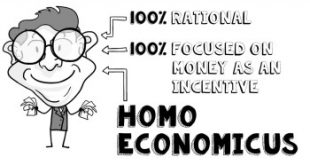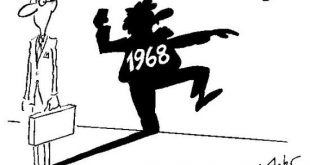L’Italia verso nuove elezioni Sergio Mattarella non ha accettato che un avversario dichiarato della permamenza dell’Italia all’eurozona, Paolo Savona, diventasse il prossimo ministro delle finanze. Giuseppe Conte, l’uomo che avrebbe dovuto diventare il prossimo presidente del consiglio, ne ha immediatamente preso atto rinunciando alla possibilità di formare un governo. A questo punto è molto probabile che l’Italia vada incontro a nuove elezioni. Dato che...
Read More »Diversity bonuses — the idea
Diversity bonuses — the idea [embedded content] If you’d like to learn more on the issue, have a look at James Surowiecki’s The Wisdom of Crowds (Anchor Books, 2005) or Scott Page’s The Diversity Bonus (Princeton University Press, 2017). Advertisements
Read More »Behavioural economics — still too devoted to ideas it is supposedly attacking
Behavioural economics — still too devoted to ideas it is supposedly attacking Behavioral economics is still ‘in a relationship’ with orthodox economics and, in a relationship, one makes compromises … We all know how stubborn the other side in this relationship is: standard economics will always ‘rationalize’ behavior wherever it can and will only recognize ‘irrationality’ when there is clear and convincing evidence of it. Understandably, behavioral...
Read More »Modern division of labour …
Modern division of labour … Advertisements
Read More »The follies and fallacies of Chicago economics
The follies and fallacies of Chicago economics [embedded content] Advertisements
Read More »Gier auf Geld
[embedded content] Advertisements
Read More »Mainstream economics — peddling fake knowledge
Mainstream economics — peddling fake knowledge Based on the [quantity theory of money equation MV = PQ] holding the money velocity constant, if the money supply (M) increases at a faster rate than real economic output (Q), the price level (P) must increase to make up the difference. According to this view, inflation in the U.S. should have been about 31 percent per year between 2008 and 2013, when the money supply grew at an average pace of 33 percent per...
Read More »Chicago delirium VSOP
Macroeconomics was born as a distinct field in the 1940s (sic!), as a part of the intellectual response to the Great Depression. The term then referred to the body of knowledge and expertise that we hoped would prevent the recurrence of that economic disaster. My thesis in this lecture is that macroeconomics in this original sense has succeeded: Its central problem of depression-prevention has been solved, for all practical purposes, and has in fact been solved for many...
Read More »Things have changed (II)
Things have changed (II) Advertisements
Read More »The evidential sine qua non
The evidential sine qua non Advertisements
Read More » Lars P. Syll
Lars P. Syll







